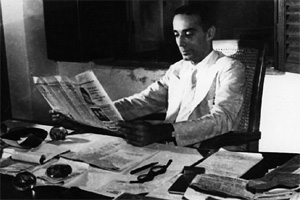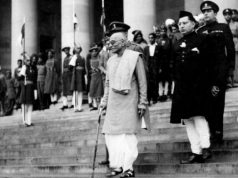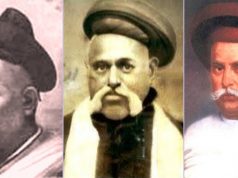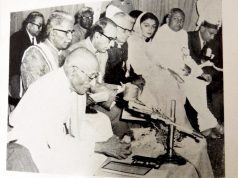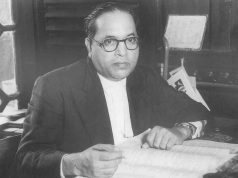Editor’s Note: Over the course of the next few weeks, we will be publishing Minoo Masani’s classic essay ‘Socialism Reconsidered.’ This is the first part of a series of posts. Minoo Masani was a liberal, politician and a member of the Constituent Assembly that drafted the Constitution. Masani started his intellectual journey as a socialist but after Stalin’s purges and takeover of Eastern Europe, he moved away from Socialism and became a supporter of free market economics and liberalism. This post is representative of his thinking at the time, when he was ‘reconsidering’ and moving away from Socialism.
Oscar Wilde has defined experience as the name everyone gives to their mistakes. Any effort by a socialist to review Socialism in the light of, say, the past twenty-five years’ experience must therefore to a certain extent involve self-criticism.
But why twenty-five years? Well, twenty-five years seems to me to be an appropriate period in the light of which to review one’s approach to, and belief in, socialism, because it is twenty-five years since the end of the last war, when people everywhere swore “Never Again”; it is also twenty-five since the Russian Revolution.
Looking back across the last two decades, one recalls some fundamental assumptions on which one based one’s faith in Socialism as the solvent of almost all the world’s ills. Those assumptions were that Man was essentially good, but that the System (with a capital S) was bad, Capitalism, with its anarchy, its creed of “Each for himself, and the devil take the hindmost,” its insistence on the profit motive, its free competition between the plutocrat on the one hand and helpless propertyless men, women and children on the other, appeared to be the enemy – the one obstacle between Man and a Happy Universe. It was Capitalism (with the accent on the second syllable) that kept the mass of toilers poor, it was Capitalism that kept women in a position of economic dependence and social inferiority, it was Capitalism that was responsible for prostitution and other social evils, it was Capitalism that kept children uneducated and ignorant, above all it was Capitalism that made repeated wars inevitable. You had but to abolish Capitalism and replace it with Socialism, and all the ills of the human race would evaporate.
All you had to do to overthrow the capitalist system and to extend democracy to the economic sphere was to abolish private property and to nationalise the instruments of production, distribution and exchange. The basis of the classless society was to be the slogan: “From each according to his capacity, to each according to his needs.” Then the whole community would be like a single family and live happily ever after! Lenin described a socialist society as a society of “the free and the equal,” where a man’s personality would have the fullest liberty to flower. These, let me stress, were the assumptions held by all schools of socialist thought. The Social Democrat insisted that in advanced, democratic countries like England and France, this transformation could be worked, not by bullets, but through the ballot box. The Communist argued that such a change could only be worked by an armed insurrection, as in Russia, by a coup d’etat and a seizure of power by the revolutionary party (namely, his own) on behalf of the Proletariat. After a short period of the Dictatorship of the Proletariat, the classless society would be established, the State would wither away and you would find yourself in the Socialist Society. It was common ground to all schools of thought that the only thing that could replace Capitalism was Socialism. It was also common ground that Socialism was an international creed and would result in world union and universal brotherhood.
There is a refreshing contrast to this rather depressing record when one turns to the record of the Socialists in certain small countries – particularly the Scandinavian group consisting of Sweden, Norway, Denmark and Finland. There has in these countries been a steady extension of democracy to the economic and social spheres which has not secured the notice and appreciation it deserves. If I were asked which countries were the farthest along the road to a Socialist Society when the war broke out in 1939, I would point to these countries.
Nationlisation – A Sovereign Cure
There are at least four major assumptions of Marxism, – there may be more – which, I believe, need to be reconsidered. The first of these is that the abolition of private property and its nationalisation will automatically bring in economic democracy and a classless society. It has not been shown in Russia that it need do nothing of the sort. What was not adequately appreciated by socialist thinkers of earlier times was that, while nationalised industry may belong to the State, the State itself may not belong to the people; that in the process of achieving collectivised economy, political democracy may get lost on the way.
It is now seen that it is possible with nationalised economy for a new class to arise which monopolises the control, and even a share in the ownership, of national property. Instead of owning individual factories and workshops and mines, as members of the capitalist class do, this class of bureaucrats and managers owns shares in all the factories and mines, as members of the capitalists class do, this class of bureaucrats and managers owns shares in all the factories and mines belonging to the State. The workers get their wages as before, but in place of private capitalists the dividends are now drawn in the form of interest on State bonds by the new privileged class. Production is socialised, but not distribution. Plutocracy is replaced, not by socialism, but by bureaucracy. The oppression of the masses is even more complete because, as Trotsky was to live to see, “in a country where the sole employer is the State, opposition means death by slow starvation. The old principle : “Who does not work shall not eat”, has been replaced by a new one: “who does not obey shall not eat.”
Nationalisation of industry unaccompanied by political democracy leads therefore to a different form of exploitation. It is not more and more realised that what matters most is not so much legal ownership of property as political control over it. If this were not so, the existing State ownership and management of railways in India would have to be accepted as socialist!
(You can access the original piece here. Visit indianliberals.in for more works by Indian Liberals dating back to the 19th Century.)
Post Disclaimer
The opinions expressed in this essay are those of the authors. They do not purport to reflect the opinions or views of CCS.

